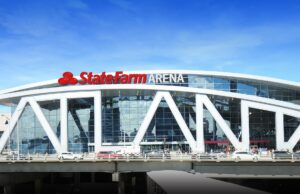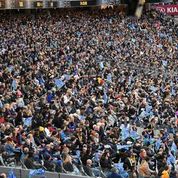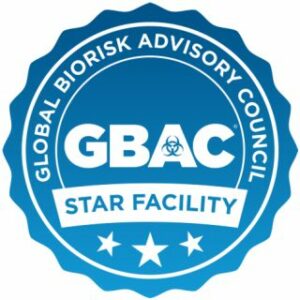Steve Romer Appointed GM of The Events Center, Caloundra
By Rebecca Kearney
Former Chief Operating Officer of Byron Bay’s Bluesfest, Steve Romer, has been appointed General Manager of The Events Centre (TEC) Caloundra on the Sunshine Coast.
Prior to Bluesfest, Romer was Chief Executive of the Venue Management Association Asia Pacific (VMA), the peak  industry association representing Performing Arts Centres, Convention Centres, Entertainment Arenas, and Sports Stadiums.
industry association representing Performing Arts Centres, Convention Centres, Entertainment Arenas, and Sports Stadiums.
He was also the former General Manager of the Sydney Entertainment Centre (SEC) responsible for the venue’s live music concerts, family shows, corporate events, and sporting events. During Romer’s tenure the SEC was ranked the #2 arena in the world, according to Billboard magazine.
Prior to this, he held various management roles including Director of Operations at the Sydney Convention and Exhibition Centre, Chief Executive of Blacktown International Sports Park, Director of Operations at Dreamworld, and Show and Entertainment Manager at Sea World.
Romer has served on many industry Boards including nine years on the VMA Board (the last three years as President), three years on the Board of the International Association of Venue Managers (IAVM), five years on the Board of the Talent Development Project (TDP), a professional program nurturing the creative talents of aspiring artists in their entertainment careers, and most recently four years on the Board of HOTA (Home of the Arts – Gold Coast).
In 2012 Steve was the recipient of the prestigious ‘Venue Professional of the Year’ award.
TEC Chairman Tim Dwyer welcomed Romer’s appointment and commented, “On behalf of the Board we are thrilled to have Steve as our new General Manager and look forward to his leadership, skills, and experience in shaping the future of the TEC.” Dwyer also gave a heartfelt thanks to retiring TEC General Manager Gary Mears, who provided “outstanding leadership and many significant contributions over the past seven years.”
Rebecca Kearney is Marketing Coordinator at The Events Center, Caloundra.
Atlanta’s State Farm Arena Creates Largest-Ever Voting Precinct
By NBA.com
Fulton County is partnering with the Atlanta Hawks to create Georgia’s largest-ever voting precinct at State Farm Arena, starting with early voting on July 20 for the Georgia General Primary Runoff Election on August 11. This unique partnership will allow tens of thousands of voters to cast their ballots for upcoming elections while maintaining CDC-recommended social distancing requirements at the state-of-the-art facility. In addition, Fulton County Registration & Elections will conduct other elections support operations at the site, including absentee ballot processing and more.
Leadership from the Hawks offered use of State Farm Arena to Fulton County as a venue for early voting and other elections operations as part of their commitment to serving the community. The Atlanta-Fulton County Recreation Authority, a government agency, is the owner of the property and leases the site to the Atlanta Hawks organization. In addition to offering the venue, hundreds of Atlanta Hawks & State Farm Arena full-time and part-time employees will be trained to serve as election workers to further support the operations.
elections operations as part of their commitment to serving the community. The Atlanta-Fulton County Recreation Authority, a government agency, is the owner of the property and leases the site to the Atlanta Hawks organization. In addition to offering the venue, hundreds of Atlanta Hawks & State Farm Arena full-time and part-time employees will be trained to serve as election workers to further support the operations.
“Fulton County is grateful to the entire Atlanta Hawks organization for being an outstanding partner,” said Chairman Robb Pitts. “Tony Ressler, Steve Koonin and their organization have once again demonstrated that the Hawks are True to Atlanta”
“When our ownership group purchased the Hawks & State Farm Arena five years ago, we were clear that we felt it was our responsibility to make sure the organization was an important civic asset to the city of Atlanta. Utilizing State Farm Arena and our incredible staff to make the arena an accessible and vital polling site in an important election year is a fulfillment on that promise,” said Atlanta Hawks & State Farm Arena Principal Owner Tony Ressler.
In February, State Farm Arena was named the Best New Concert Venue in the United States by Pollstar Magazine and prior to that was honored by the International Association of Venue Managers (IAVM) with the 2019 Venue Excellence Award (VEA). For the second consecutive season, the Hawks finished with the NBA’s top ranking in overall in-game experience, a wide-ranging category made up of the following areas where the team rated highly: arena ushers, in-game entertainment, in-arena technology, in-arena retail, in-arena food experience and more.
“State Farm Arena is an ideal solution to help us serve thousands of voters while maintaining social distancing requirements,” said Mary Carole Cooney, Chairperson of the Fulton County Board of Registration & Elections. “We appreciate the Hawks for coming to us with this creative solution.”
To provide greater accessibility to voting, the Hawks Foundation will be providing free parking to individuals accessing the venue to vote. More than 1,500 parking spots surrounding the arena will provide complimentary parking for vehicles with a voter.
Sodexo, Centerplate to Host July 8 Webinar on Convention & Conference Centers Reimagine Live Events
By Paul Pettas
Sodexo and Centerplate are hosting a webinar entitled Convention & Conference Centers Reimagine Live Events, on Wednesday, July 8, at 11 a.m., Eastern Time, with IAVM First Chair Rip Rippetoe, CVE, featured as the guest expert.
In the midst of never-before-imagined circumstances, convention and conference centers have an opportunity to set a positive course for the next normal. By embracing new ways to live our lives, we can reimagine what is possible.
set a positive course for the next normal. By embracing new ways to live our lives, we can reimagine what is possible.
In this webinar, we will discuss the importance of live events in the COVID-19 world. Rippetoe, President and CEO of the San Diego Convention Center Corporation, will provide his point of view and vision for the future.
We will share proprietary research and quantitative insights by Harris Interactive for Sodexo focusing on consumer sentiment about attending a live event in the COVID-19 world.
Steve Pangburn, CEO, Sodexo Sports and Leisure North America, will share the company’s comprehensive approach to help you prepare for the changes ahead and his vision of emerging trends. Technology and Corporate Social Responsibility are more important than ever.
Other panelists include Nathalie Bellon-Szabo, CEO, Sodexo Sports & Leisure Worldwide, and Claire Morris, Global Marketing Head, Sodexo Sports & Leisure.
To register now for the webinar, click here.
Also, attendees will need to download WebEx for this webinar.
Paul Pettas is Communications Director for Centerplate.
New Zealand’s Eden Park Welcomes Capacity Crowd of 43,000 to Rugby Match as Country Re-Opens Sporting Events
By R.V. Baugus
Dig if you will a picture … sorry, just had to go with some Prince lyrics because, for most of the world, hosting a sporting event before a sold-out crowd of 43,000 where patrons actually sat next to each other and where technology played a major role in allowing that to happen is indeed right now just a picture.
But for Nick Sautner, Chief Executive officer of Eden Park, the picture was real when the Blues and Hurricanes played a Super Rugby Aotearoa match before a sports-thirsty crowd on Sunday, June 14.
played a Super Rugby Aotearoa match before a sports-thirsty crowd on Sunday, June 14.
“We were central to the success of the rebuilding of the nation,” Sautner said in a comment that is anything but exaggeration. “People just wanted to at a part of history. Before the match the crowd impromptu stood and acknowledged and clapped the essential workers that had implemented the response to COVID-19. From an Eden Park perspective, we’re the national stadium and have been a venue for over 117 years. We have arguably been the home of some of this country’s most memorable sporting moments. We have been seen around the globe and we feel it was one of those events that people will talk about for many years to come.”
The first question you want to ask, obviously, is how was this able to be accomplished.
Sautner explained that the venue had worked with the government on a COVID code that included contact tracing along with the installation of additional sanitizing stations at all entries and food and beverage outlets. An overlay of additional cleaning ensured that high-touch surfaces were regularly cleaned throughout the venue.
“The government had also been able to perform contact tracing through a bespoke and ticketing,” Sautner said. “People had the discretion to scan their QR code in the event that there was a requirement to be contact traced. We worked with our ticketing agency Ticketmaster to ensure that we had all the information of the attendees at the fixture, but the government had declared that the country was COVID-free some four and a half days out from the fixture. We provided real confidence and comfort to the people of New Zealand that they could safely attend the park.
“The health of staff, athletes, and patrons remains our priority and our team has played a key role in developing ‘the COVID Code’ for Government. Following the move to Alert Level 1, a number of additional measures will be in place at Eden Park such as sanitizer stations, hygiene promotion signage, and additional cleaning of frequently used surfaces. The Park’s QR code will be available for those utilizing the NZ COVID Tracer App.”
Indeed, signage also played a major role throughout the venue to assist fans, many of whom likely forgot what it was like to attend a sporting event since the last event had taken place three months ago.
“We implemented a significant signage program on entry, on league doors, on bathrooms and toilets,” Sautner said. “It is just that continual reminder. We had a sanitizing station before people entered, and at food and beverage outlets. Again, it’s just providing that level of comfort.
“We worked with our caterer and felt that to give comfort to our patrons that the presentation of the outlets needed to be of high standard and arguably from a venue perspective they are.”
 When asked about the biggest upside of the event, Sautner cited maybe the simplest thing he could — that people were actually able to come and enjoy a sporting event and the escapism that attending live events provides.
When asked about the biggest upside of the event, Sautner cited maybe the simplest thing he could — that people were actually able to come and enjoy a sporting event and the escapism that attending live events provides.
“The challenge of COVID has been with us the last three months,” he said. “Pretty much immediately all our revenues ceased. We were required to put systems into place to address that whether it be reducing our staff or our hours of operation and also eliminating redundancies.
“But coming out the other side, we’ve got a theme of Emerging Stronger, because we do feel that during lockdown people have been starved for live sports. There was no question people attended the event with family and friends and they walked away thinking this is something that we haven’t had the opportunity to experience over the lockdown and we look forward to coming again.
“So the upside for us is the failure to have live sports and entertainment and the escapism that provides so we are hopeful that irrespective of the economic climate that people will still want to attend our facility and have that escapism and bring the community together.”
It wasn’t just fans who packed the venue. A total of 3,000 staff was in place covering cleaning, catering, security, traffic management, medics, facilities, turf management, maintenance, and operations. The number of catering staff was 702, and among the food and beverage fun facts was 47,000 total beverages sold, 17,500 total meals served, and more than 10,000 portions of chips served.
Still, it was the joy on the faces of fans that stuck with Sautner as he walked the venue during the match.
“First, I do enjoy walking,” he said. “I feel privileged to be the CEO of Eden Park and proud of the team and their ability to deliver the event in such short notice. But to walk through the crowd and see the joy and happiness on the faces of families and friends … you could see that it really was a moment in time that will be remembered. The world and the country had been facing and continues to face … to be able to come to a stadium as a community to reconnect and experience that escapism that the happiness, the joy and the feedback we have seen on social media and the commentary internationally just again demonstrates why we work in the industry we do.”
Finally, Sautner spoke to the pride of the country.
“The Prime Minister in New Zealand talks about being a team of 5 million that have been able to contribute in addressing COVID-19. I spoke to the team prior to the event about how we were going to be on display to the world and we needed to be able to ensure that we did deliver the event so that gave confidence to so many that had been starved and were craving to get back in to the stadium. We came through in flying colors.”
Georgia World Congress Center First Venue to Achieve GBAC STAR Facility Accreditation
By Jon Adkins and R.V. Baugus
The Global Biorisk Advisory Council (GBAC), a Division of ISSA, announced that the Georgia World Congress Center, site of IAVM’s VenueConnect in July 2021, is the first public assembly venue to achieve GBAC STAR™ facility accreditation. The GBAC STAR program helps commercial and public facilities of all sizes establish and carry out a systematic approach to cleaning, disinfection and infection prevention.
“Congratulations are in order for the Georgia World Congress Center, which has put time and energy into  reviewing their cleaning procedures alongside GBAC STAR’s criteria,” said GBAC Executive Director Patricia Olinger. “We look forward to the many accreditations that will follow as other organizations seek third party validation from GBAC.”
reviewing their cleaning procedures alongside GBAC STAR’s criteria,” said GBAC Executive Director Patricia Olinger. “We look forward to the many accreditations that will follow as other organizations seek third party validation from GBAC.”
Boasting more than 4 million square feet of total space, Georgia World Congress Center features 1.5 million square feet of flexible exhibit space, and is one of only a few venues to offer more than 1 million square feet of contiguous exhibition space. As the world’s largest LEED certified convention center, GWCC welcomes more than 1 million visitors annually. GWCC was among the first convention centers in the country to commit to achieving GBAC STAR certification to make future gatherings safer.
“We are honored to be pacing the industry by achieving GBAC STAR accreditation,” said Frank Poe, executive director of Georgia World Congress Center Authority. “Although events will look different moving forward, our commitment to our customers, show attendees, and team members that the highest cleaning and disinfection protocols are being implemented at GWCC hasn’t changed. We would expect nothing less of ourselves and for our facility.”
“Frank Poe and Brett Mitchell have been leaders of this initiative and this council,” said Mark Herrera, IAVM Director of Education and Life Safety. “They and the GBAC working group have helped set the tone for the entire industry to explore and to assure that the decisions we make pertaining to the health and well-being of our number one asset — people — is never compromised. To have a reputable accrediting body such as the Global Biorisk Advisory Council as part of the venue industry startup focused on cleaning and disinfecting certify our venues only speaks to the more than reasonable efforts we are assuring as an industry and not circumventing health precautions.”
“GBAC STAR is a great third party certification for bio-hazard sanitation accreditation and integral part of ensuring public assembly venues are safe for everyone who enters,” added Brad Mayne, CVE, IAVM President and CEO. “We thank Frank Poe, Brett Mitchell, and the entire GBAC Public Assembly Facility Health and Safety Working Task Force for their amazing work with ISSA on moving this initiative forward in an expedient manner.”
Facilities and organizations in 30 countries are adopting the GBAC STAR program to ensure they follow best practices in the wake of the COVID-19 pandemic. These include professional sports venues, hotels, restaurants, convention centers, airports, churches and more.
“With the threat of coronavirus still high in many areas, people want assurance that facilities are taking extra precautions to enhance cleanliness and safety,” said ISSA Executive Director John Barrett. “Whether an organization has space for millions or just a few employees, GBAC STAR will continue to be an important indicator of a facility’s thoroughness around cleaning, disinfection and infection prevention.”
To learn more about GBAC STAR accreditation criteria and access an application, click here.
To view additional committed facilities and supporters, go here.
Jon Adkins is Vice President, Marketing & Communications for ISSA, of which GBAC is a division.
Do you want to receive a Front Row News weekly digest?
Categories
- Allied (861)
- Architecture (147)
- Arenas (750)
- Career (897)
- Convention Centers (897)
- Education (623)
- Events (1,544)
- Food & Beverage (193)
- Foundation (113)
- Guest Experience (1,497)
- Industry News (2,270)
- Leadership (1,888)
- Marketing (150)
- Membership (2,001)
- Music (213)
- Performing Arts Centers (456)
- Professional Development (409)
- Research (128)
- Safety & Security (442)
- Sports (764)
- Stadiums (611)
- Student (159)
- Technology (516)
- Ticketing (92)
- Touring (82)
- Trends (365)
- Uncategorized (718)
- Universities (218)
- Video (25)
- Young Professional (198)
Twitter Feed
- Twitter feed loading
Recent Posts
- Monumental Sports & Entertainment Unveils State-of-the-Art Washington Capitals Locker Room & Player Compound as Part of the Brand-New Capital One Arena
- F&B’s Hugh Gallagher, Premium Experience Aficionado, Dies Unexpectedly
- Oak View Group Appoints Amy Latimer Chief Business Officer, Oak View Group
- Crypto.com Arena’s Vice President of Security Ron Little Awarded 2025 WNBA Venue Manager of the Year
- Miami Beach Convention Center (MBCC) Announces Encore as Preferred AV/Rigging and Digital Services Venue Partner
Categories
- Allied
- Architecture
- Arenas
- Career
- Convention Centers
- Education
- Events
- Food & Beverage
- Foundation
- Guest Experience
- Industry News
- Leadership
- Marketing
- Membership
- Music
- Performing Arts Centers
- Professional Development
- Research
- Safety & Security
- Sports
- Stadiums
- Student
- Technology
- Ticketing
- Touring
- Trends
- Uncategorized
- Universities
- Video
- Young Professional
Archives
- October 2025
- September 2025
- August 2025
- July 2025
- June 2025
- May 2025
- April 2025
- March 2025
- February 2025
- January 2025
- December 2024
- November 2024
- October 2024
- September 2024
- August 2024
- July 2024
- June 2024
- May 2024
- April 2024
- March 2024
- February 2024
- January 2024
- December 2023
- November 2023
- October 2023
- September 2023
- August 2023
- July 2023
- June 2023
- May 2023
- April 2023
- March 2023
- February 2023
- January 2023
- December 2022
- November 2022
- October 2022
- September 2022
- August 2022
- July 2022
- June 2022
- May 2022
- April 2022
- March 2022
- February 2022
- January 2022
- December 2021
- November 2021
- October 2021
- September 2021
- August 2021
- July 2021
- June 2021
- May 2021
- April 2021
- March 2021
- February 2021
- January 2021
- December 2020
- November 2020
- October 2020
- September 2020
- August 2020
- July 2020
- June 2020
- May 2020
- April 2020
- March 2020
- February 2020
- January 2020
- December 2019
- November 2019
- October 2019
- September 2019
- August 2019
- July 2019
- June 2019
- May 2019
- April 2019
- March 2019
- February 2019
- January 2019
- December 2018
- November 2018
- October 2018
- September 2018
- August 2018
- July 2018
- June 2018
- May 2018
- April 2018
- March 2018
- February 2018
- January 2018
- December 2017
- November 2017
- October 2017
- September 2017
- August 2017
- July 2017
- June 2017
- May 2017
- April 2017
- March 2017
- February 2017
- January 2017
- December 2016
- November 2016
- October 2016
- September 2016
- August 2016
- July 2016
- June 2016
- May 2016
- April 2016
- March 2016
- February 2016
- January 2016
- December 2015
- November 2015
- October 2015
- September 2015
- August 2015
- July 2015
- June 2015
- May 2015
- April 2015
- March 2015
- February 2015
- January 2015
- December 2014
- November 2014
- October 2014
- September 2014
- August 2014
- July 2014
- June 2014
- May 2014
- April 2014
- March 2014
- February 2014
- January 2014
- December 2013
- November 2013
- October 2013
- September 2013
- August 2013
- July 2013
- June 2013
- May 2013
- April 2013
- March 2013
- February 2013
- January 2013
- May 2012
- March 2012
- December 2011
- November 2011
- October 2011
Recent Comments
- Frank Bradshaw, Ph.D., CVE on John Meyer, CVE, a Tireless Advocate of Certification for Venue Professionals, Has Died
- Neil Sulkes on Hilary Hartung, Friend to Many in Venue Marketing, Has Left Us
- Jason Parker, CVE on The Devastation of Hurricane Helene and How We Can Support One Another
- Larry Perkins on Touhey Testifies Against Speculative Ticketing Before Congressional Subcommittee
- Peter Secord on Major Players for Planned Elkhart Amphitheater Were in the Mix at VenueConnect
